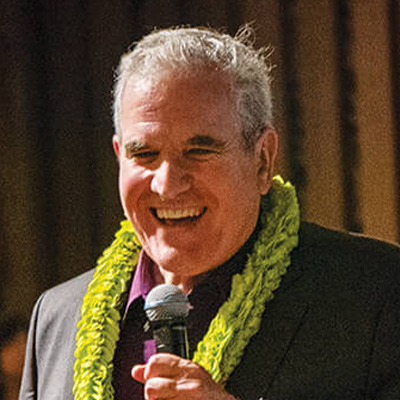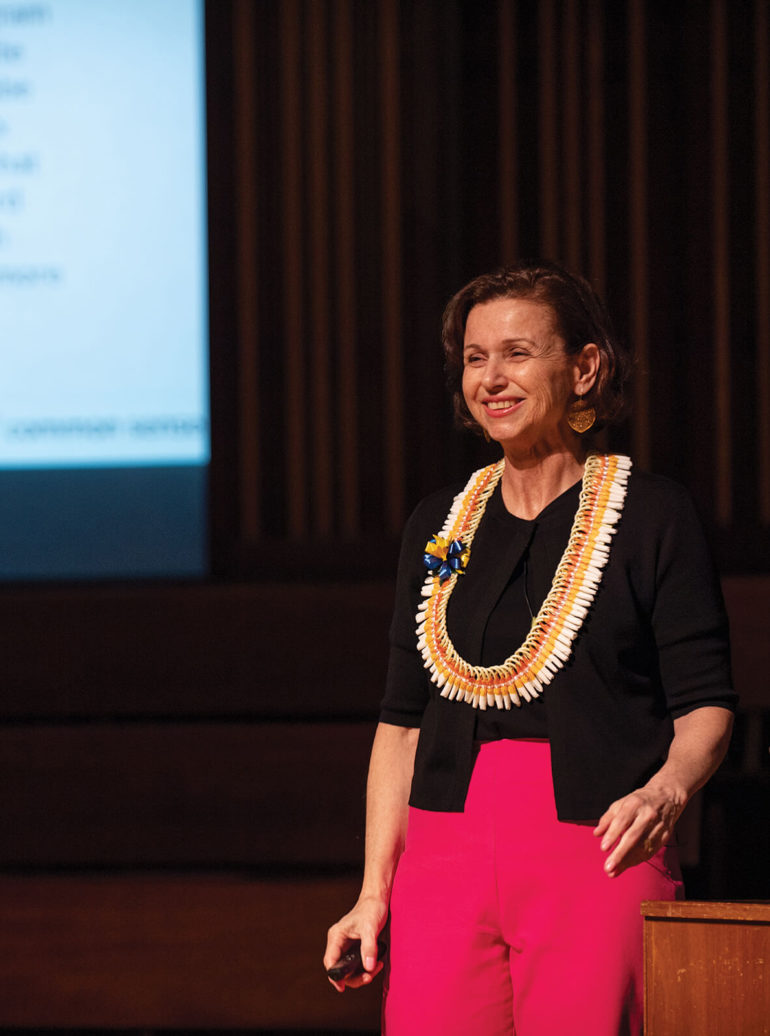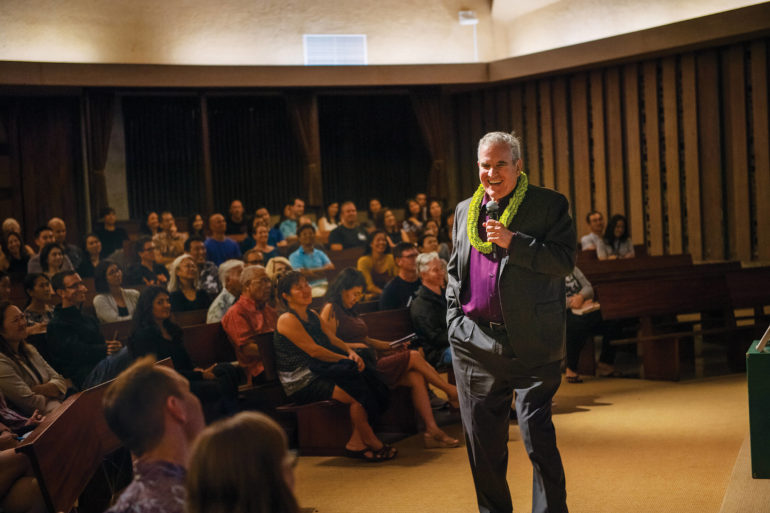By Diane Seo ’85
Earlier this year, Punahou launched its Team Up program for parents, with three notable speaker events and a new podcast. The speakers discussed a variety of issues, including how parents can help their children stay safe online and what skills students will need in college and the workplace. In addition to the speaker sessions, Punahou has a new Team Up parenting podcast, which includes interviews with national and local guests. Please visit punahou.edu/teamup for information about upcoming events and the latest podcast episodes.
Linda Burch

Linda Burch, co-founder and chief education and strategy officer of Common Sense Media, spoke in February to Punahou parents about how to help their children and teenagers navigate the digital world. Common Sense is the nation’s leading nonprofit organization that shares information and offers strategies to help kids utilize technology in safe, responsible and ethical ways.
According to a Common Sense report, tweens now spend a daily average of five hours on their phone, while teens spend on average 7.5 hours. “When you think about what has happened over the course of the past 15 years, it’s really remarkable,” Burch said. “When we founded Common Sense in 2003, there was no Facebook, Twitter or TikTok. The iPod was a year old, and Google wasn’t yet a verb. Fast forward to today, and media and technology is affecting every part of our kids’ lives. They are on their devices and social media 24/7 and have access to information and people around the world.”
While this landscape has positive potential for creative expression, connections and learning, there are also challenges, including being exposed to inappropriate content, digital distraction, cyberbullying and hate speech. “Navigating this rapidly evolving digital landscape requires families to have control, understanding, and trust when it comes to the role tech plays in their lives,” Burch says. “The challenge of this ever-evolving digital world is not going away, but I’m hopeful that working together, parents and educators can raise a generation of digital citizens and create a world we are proud for them to inherit.”
Burch offered parents the following guidelines to help kids use technology safely and responsibly:
- Embrace their world: Engage with your kids and encourage a dialogue about what they’re seeing, playing, creating and posting, as well as how they’re communicating. If your kids play video games, play with them to understand the games better.
- Do your homework: Reference the Common Sense Parents’ Ultimate Guides, which offer information about YouTube, Instagram, TikTok, Fortnite, parental controls and more. Also check out Common Sense’s library of reviews to choose age-appropriate apps, games, movies, TV shows, websites and books.
- Set limits: Establish rules and boundaries with your family regarding technology usage. Common ones include device-free dinners, device-free car rides, time limits for digital usage and the time when everyone puts their devices in a central place to charge for the night. Start doing this when your children are young.
- Protect privacy: Teach your children to protect their digital privacy and to respect the privacy of others. Remind them they’re creating a “digital footprint,” so they need to know the power of their words and actions.
If you’re concerned about an app, download it and try it yourself: For instance, with TikTok, participants create and share lip synching videos, and comment on them. But there are concerns about privacy, bullying and age-inappropriate content.
- Address cyberbullying: If you discover your child is being exposed to hate speech or cyberbullying, either as a perpetrator or a recipient, the first step is to listen. Don’t get too alarmed, ban the cell phone or call the school immediately.
- Be a good role model: Remember, your kids are watching you. Parents need to disengage from their technology too and show kids how to be present.
Rob Evans and Michael Thompson

Rob Evans and Michael Thompson, two notable authors and school consultants, also came to Punahou to talk to parents about how they can prepare their children for a successful and meaningful future. Thompson is the author and co-author of several books, including the New York Times bestseller, “Raising Cain: Protecting the Emotional Life of Boys.” Evans is a child and family therapist who has authored three books and consulted with schools throughout the world.

The topic of their Feb. 19 talk – Rigor, Emotional Intelligence, and The Real Roots of Success – correlated with the School’s ongoing efforts in Competency Based Learning, which prioritizes teaching such skills as communication, collaboration, creativity and flexibility – all of which are becoming increasingly important skills for college and the workplace.
During their presentation, Evans told parents that for many years, the thinking about preparing children for the future involved instilling the most rigorous academic curriculum. Then, as college admissions became more competitive, many schools not only increased the quantity of what kids would learn, but began pushing it on younger children. Now, however, educators, CEOs and others are determining that “soft skills,” including empathy, a capacity to adapt, rebound, connect with others and be flexible, are also essential for success.
“It’s not casting out the rigor; it’s a question of balance,” he said. “At Google, they’ve decided that it’s useless to know what a job applicant’s college grades were or SAT scores, so they don’t bother to ask anymore. They’re not going to hire you based just on those kinds of credentials alone.” Many students also are suffering from severe stress and anxiety, and while it’s not just school rigor that’s causing this, students aren’t developing the emotional strength or “soft skills” they need to thrive. Thus, schools such as Punahou have integrated programs like RULER, a social emotional learning program developed by the Yale Center for Emotional Intelligence, Thompson said. “Not all important learning is school-based,” Thompson said. “There are many kids who are going to be successful when they get out of school because they’re just not cut out for academics, but their journey should be trusted.”
Here are some tips Evans and Thompson have for parents:
- Lighten up: Accept that children have their own individual strengths and weaknesses. “Life trajectories are going to be different, and there are limits on how much we can shape those,” Evans says. “Most kids are going to end up activating their strengths. When you choose to send them to a school like [Punahou], you stand a much better chance of this happening, so a key question is not how your kid becomes things she is not, but how can she be the best of who she is?”
- Teach by example, instead of by sermon: “When you think you’re teaching your kids, you’re preaching to them,” Evans says. “If we’re honest, we would say that we learned much more from the example our parents set, rather than from the sermons they preached.”
- Trust your child’s development: “Trust your child’s journey, even if he or she is not in the top half of the class, because some of these kids are developing more persistence, perseverance and grit,” Thompson says.
- Foster social and emotional skills: “A child can’t know what empathy is unless he or she has experienced it,” Thompson says. “You teach empathy by being empathetic to your child. Then you ask your child to identify a situation where empathy is required. And then at times, you ask your child to practice empathy. These are habits of heart, habits of mind and habits of practice. That’s how you teach social emotional skills.”
Leonard Sax

Leonard Sax, a physician, psychologist, speaker and bestselling author, spoke to Punahou parents about what they can do to raise respectful, principled children amid a challenging cultural landscape.
Citing research as well as his own observations from more than 30 years of clinical experience as a family doctor, Sax says American children and teens are bombarded by inappropriate content on YouTube, social media, video games, television, movies and music, and this is having a detrimental effect on them. Fifty years ago, American popular culture was healthy and nurturing, while today, it’s a culture of disrespect, said Sax, the author of four books, “Why Gender Matters,” “Boys Adrift,” “Girls on the Edge” and “The Collapse of Parenting.”
For instance, many of today’s top celebrities routinely create songs, movies and videos that display disrespect toward others. In writing “The Collapse of Parenting,” he reviewed the 150 most popular television shows in the United States to see how many of them depict a parent as knowledgeable, competent, reliable, thoughtful and kind. “Out of 150 shows, I found only one (‘Blue Bloods’) that depicts a parent, at least occasionally this way,” he says.
Sax encouraged parents to establish rules and expectations with their children, particularly with their usage of phones and video games. Parents have an opportunity to instill in their children a desire for something more meaningful than social media and video games, he says, “It’s important to teach children the importance of virtue, character and self-control.”
The Danger of Video Games
One of the influences that parents need to watch out for, particularly among boys, are video games, Sax said. The average American boy now spends nine hours and 13 minutes a week playing video games, compared with one hour and 38 minutes a week for the average girl. Sax said researchers have found that prolonged video game playing correlates to lower academic performance. “The kid who spends 10 hours a week playing video games does less well in school than the kid who spends five hours playing video games,” he said.
Social Media and Phones
While boys are more inclined to play video games, girls are much more active on social media, and the danger of this is that they focus on performing instead of living, Sax said. “Many of them are trapped in the ‘cyberbubble’ – 24/7 texting and social media, and the show never ends,” he said. Researchers are also finding that the more time a teenager spends on social media, the more likely that teenager is to become depressed.
Sax’s suggestions:
- Set time limits for usage of social media by using parental controls. Sax says 30 minutes a day should be sufficient.
- Learn about every social media app your child uses.
- Don’t allow phones and other devices in the bedroom. Devices should be used in a public space like the kitchen or the living room, Sax says, adding that this is an official guideline of the American Academy of Pediatrics.
- Install parental monitoring software on your teenager’s phone.
Listen to Our Team Up Podcast!
Punahou has launched a new podcast – Team Up – featuring interviews and conversations with local and national guests who address a variety of issues affecting parents and families.
Punahou’s Team Up podcast is available on Apple Podcasts, Google Play, Spotify and Simplecast.
For our inaugural episode, Punahou Junior School Principal Paris Priore-Kim ’76 spoke with Linda Burch of Common Sense Media, about how parents can help their children navigate the digital world. For our second episode, Punahou President Mike Latham ’86 spoke with Michael Thompson and Rob Evans about the critical skills students need for the workplace.





